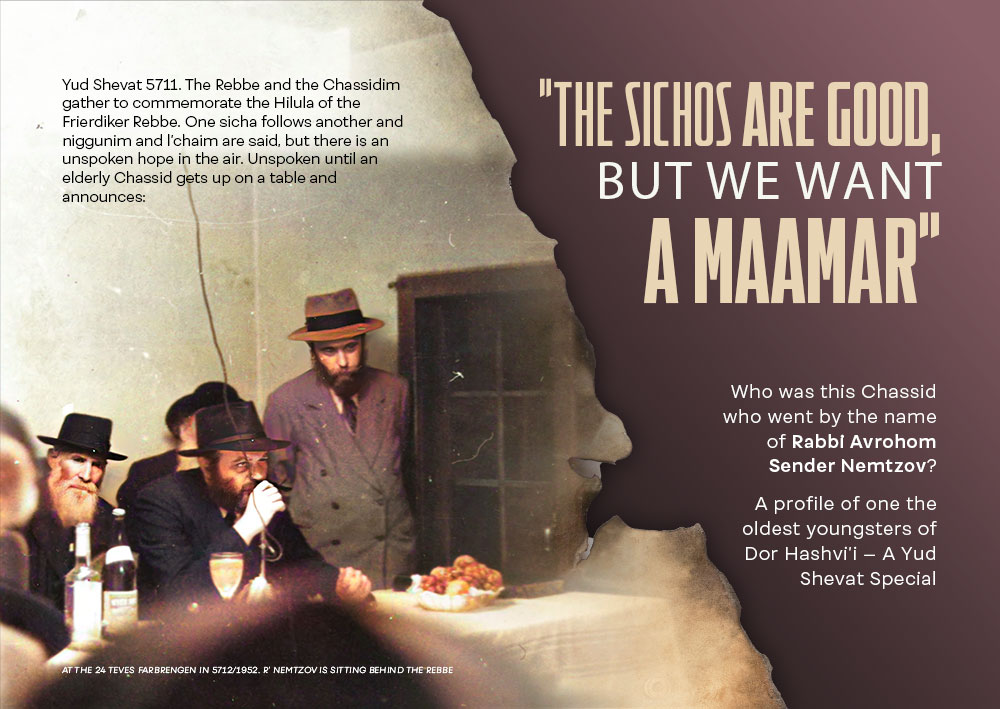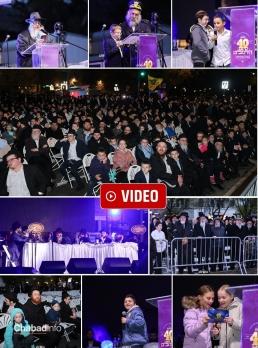“The Sichos are Good, But We Want a Maamar”
Yud Shevat 5711. An elderly Chassid gets up on a table and announces: “The Sichos are Good, But We Want a Maamar” Who was this Chassid who went by the name of Rabbi Avrohom Sender Nemtzov? A profile of one the oldest youngsters of Dor Hashvi’i • By Beis Moshiach Magazine • Full Article
Refael Dinari, Beis Moshiach
Rabbi Avrohom Sender Nemtzov was born in the town of Kamin near the city of Vitebsk in White Russia, around the year 5631/1870, possibly 1865. He grew up in a Chassidishe family where he absorbed fear of heaven and the ways of Chassidus.
He suffered greatly in his childhood. When he was a baby, his tongue once touched a candle flame. He was severely burned and was mute afterward. He did not utter a sound and the townsfolk called him Avrohom the Mute. When he was seven he was once playing at the house of one of the neighbors, a gentile woman, and she cursed him with terrible curses.
His mother found out and she was very frightened by the curses. She asked one of the children of the Tzemach Tzedek to bless the child. When he saw that the boy did not speak, he asked whether he could hear and was told he could. “If he hears, then he will speak too,” said the Rebbe. Avrohom Sender left the house with his mother and from the curse emerged a blessing and the boy began to speak like anyone else.
Because of his prior muteness, his teachers did not pin great hopes on him, but to their great surprise he became a sharp and diligent student. The local community decided to send him to any yeshiva he wanted and they would pay all his expenses: for the trip, sefarim, clothes, and food.
Before he decided which yeshiva he wanted to go to, he was forcibly inducted into the Czar’s army for six years. He was twenty years old.
IN THE CZAR’S ARMY
The first obstacle he faced was kosher food. Avrohom Sender was moser nefesh for the kashrus of the food he ate. He did not touch cooked food and any other food regarding which he had any suspicions. His food consisted primarily of salted fish, bread, and water. After a period of serving in the army, one of the soldiers tattled on him, saying he did not eat in order to weaken his body and be exempt from difficult tasks. Avrohom Sender was called to his commander and was censured. He explained that he only ate kosher food. The commander did not accept this. “We have ways of convincing you to eat whatever the army serves,” he said angrily.
An idea popped into Avrohom Sender’s mind. “Give me a month in which I eat what I please and then test my strength against the other soldiers in this brigade. If my strength is on par with my peers, I will be able to continue as I choose, and if not, you will decide what I eat.” Needless to say, he did not, G-d forbid, intend on eating treif, even if he did not pass the test. He simply hoped this would be his way out.
The commander agreed and the experiment got underway. Avrohom Sender, who was thin but strong and energetic, ate large quantities of what he was allowed to eat and he prayed and hoped for a miracle.
A month later, all the soldiers were called to the commander. He ordered them to run fast. They all ran fast, but Avrohom Sender outran them all. The commander couldn’t believe his eyes and gave him a harder test. He gave him a heavy and cumbersome rifle which was hard to hold with even two hands. “Lift this with one hand,” he ordered.
Avrohom Sender lifted the rifle with difficulty but he managed. The commander enjoyed the test and allowed him to eat whatever he saw fit.
His elevated character was seen even in his conduct with his fellow soldiers. During the frigid winter, when it went down to thirty below zero, the soldiers were on guard for only a few hours and then replaced so they would not freeze. One night, as he stood at his guard post, it was midnight and the person who was supposed to replace him remained sound asleep. It was one o’clock and there was still no replacement. The cold had penetrated his bones and he was afraid he would freeze and so he began to run back and forth around the guard post until six in the morning when a different soldier came to replace him. In these rare situations, the soldiers would tattle and the sentence for the missing guard would be execution, but Avrohom Sender did not report the wayward soldier even though it entailed great suffering for him.
When six years were over, and he was twenty-six, he returned home as strong in his ways as when he left. He asked the people of the community to keep their promise of six years before of paying for him to go to yeshiva. The community agreed and he chose a yeshiva that had just opened, Yeshivas Tomchei Tmimim in Lubavitch.
WHY BE A MISNAGED?
Upon arriving in Lubavitch he heard that not everyone was accepted into the yeshiva and that there were tough acceptance conditions. His age was another problem, as all the other students were much younger than him. But he insisted on learning in the yeshiva, wanting to be in the presence of the Rebbe Rashab. He got the Chassid, R’ Shaul, his mother’s brother, involved. R’ Shaul went to the Rebbe’s room while Avrohom Sender stood tensely outside.
R’ Shaul told the Rebbe that Avrohom Sender strongly desired to learn in Lubavitch. “He is a talmid who excelled in his town which is why they paid to send him here,” he said, but to his dismay, the Rebbe said no because of his serving in the army for years among gentiles, and his being older and set in his way of thinking.
“We want young bachurim to whom we can speak about avodas Hashem,” concluded the Rebbe.
R’ Shaul left the room greatly disappointed and sadly told Avrohom Sender that he had to find another yeshiva.
“Tell the Rebbe that I have two reasons for which I deserve to be accepted into the yeshiva. First, I could have gone to any yeshiva in Russia and Poland, including established yeshivos with good reputations, but I still want to learn in this new yeshiva which was just founded and nobody knows anything about. Second, why should I learn in Litvishe yeshivos and become a lamdan and a misnaged if I could be a Chassid?”
R’ Shaul nervously went back to the Rebbe Rashab and presented his nephew’s reasons. The Rebbe felt that the bachur truly wanted to learn in Tomchei Tmimim and said he should be accepted.
That was how Avrohom Sender became one of the first tmimim in Lubavitch. He learned there for two years. While he learned in yeshiva, he simultaneously gave a shiur in Gemara to balabatim in the beis medrash in Lubavitch, a job previously filled by the Chassid, R’ Elchonon (Chonye) Morosov, may Hashem avenge his blood.
After spending two years in the presence of the Rebbe Rashab and Rebbe Rayatz, he married Shayna Sarah Mendel. He worked as a shochet. For a month or two a year he was home in White Russia and then he spent the remaining months travelling to various towns and settlements to shecht.
This way of life continued until 5664/1904 when, in the middle of the Russo-Japanese War, the Rebbe Rashab told him to emigrate to England.
R’ Avrohom Sender moved to England and settled in Manchester. He was one of the first Chabad Chassidim to arrive in England and together with other Chassidim he started the Chabad community in his city. The Chassidim in England were few and isolated. The Rebbe Rayatz wrote about this in 5691/1931 to R’ Yitzchok Dubov at the end of a response to a letter in which he had written that in their kehilla there were people who know nothing of Chassidus. “That they console themselves that once a week they get together, our friend, R’ Rivkin and our friend, R’ S. and R’ Avrohom Sender the shochet and they learn, I cannot be consoled with their consolation … May Hashem help them to come to an inner awareness what is their mission in living in exile in that country which without a doubt each of them understands.”
For a livelihood he continued working in shechita. Once a month, when the salaries were paid, he would go to get his salary but when he arrived home, he was empty-handed. When his wife expressed her surprise he explained that on the way he met paupers and he gave a little to each one and the money ran out. When this repeated itself a number of times, his wife arranged to have the salary come directly to her.
During the period that he lived in London, he sent esrogim on a number of occasions to Jews living behind the Iron Curtain.
MAN OF TRUTH
R’ Avrohom Sender was by nature a truthful person. He was particular about everything, even those things that people treat with casualness. When he davened in shul, he did not allow anyone to talk during the davening. Even if a distinguished member of the community was talking during the davening, he would fearlessly censure him.
He was also very particular about the laws of shechita. When some fellow shochtim tried to formulate new work rules, he was concerned about certain leniencies that would result and although he was one person against the majority, he fought so that the new rules would not be accepted.
So too with Chassidic customs. His descendants relate that all his life he wore clothing that closed right over left which you can see in pictures of him.
He was a strong man. One Erev Yom Kippur, when he returned home after many hours shechting Kaparos, he was exhausted and hungry and thirsty. He saw a bottle and thought it was whiskey. He took a drink and suddenly felt a strong burning in his throat. It turned out to be kerosene! He was in terrible pain and throughout the day he could not eat or drink, not during the final meal either. Despite the events of that day, he was able to fast until after Yom Kippur, which was nearly two days without food and drink.
R’ Avrohom Sender was considered a Talmid Chacham. After a day at shechita he would give shiurim. He had a wealth of knowledge in Gemara, Halacha, and Chassidus.
Over the years, he wrote a book of chiddushim titled Eidus L’Asaf which was published in his later years. It deals with “explanations on difficult passages in the Gemara, Medrash, Rashi, and explanations to bolster religion,” as it says in the introduction. When he sent the work to the Rebbe MH”M, the Rebbe reviewed it and made comments. In addition, R’ Avrohom Sender merited to have dozens of responses from the Rebbe on Torah topics.
In Shevat 5697, when the Rebbe Rayatz was in Paris, R’ Avrohom Sender went to Paris and had yechidus. The Rebbe said to him, “You sought the truth, you found the truth, and you live the truth.”
DEMANDING THE ACCEPTANCE OF THE NESIUS
As soon as he heard about the passing of the Rebbe Rayatz, R’ Avrohom Sender sent a telegram of consolation to 770 which he concluded with the words, “May Hashem console us with Menachem.” In this way, he expressed the anticipation and hopes of the Chassidim that the Rebbe succeed the Rebbe Rayatz and accept the mantle of leadership of Chabad.
Upon the conclusion of shiva, the elder Chassidim in England, led by R’ Yitzchok Dubov and R’ Avrohom Sender Nemtzov, had Anash in England sign a ksav hiskashrus at the top of which it said: “To the Rebbe shlita, Melech HaMoshiach.” Already back then, it was a “given” to Chassidim that the Rebbe was not just a Rebbe but also Moshiach.
They sent the ksav hiskashrus to the United States on Sunday, 2 Adar, and on 25 Adar, the Rebbe read the pidyon nefesh with the names that were signed at the gravesite of his father-in-law. Then he wrote personal letters to each of the organizers of the pidyon nefesh. R’ Nemtzov received a letter that was about the significance of 2 Nissan. In the margin the Rebbe wrote by hand: “I received the letter of 2 Adar. Surely R’ Yitzchok Dubov conveyed what I told him about this when he was here. I mentioned those who signed while I was at the tziyun.”
(Three days after the passing of the Rebbe Rayatz, R’ Dubov asked the Rebbe to accept the nesius and the Rebbe reacted sharply, “What do you think, [and he referred to himself by name] is a Rebbe?”)
Yud Shevat marked the end of the year of mourning and it was nearly certain that the Rebbe would accept the nesius even though he had refused to give prior official notice. The Yud Shevat farbrengen was scheduled for motzaei that day. Many Chassidim went to 770 and crowded into the small shul. In the first sicha, the Rebbe spoke about hiskashrus to the Rebbe Rayatz. In the second sicha there was a more open hint. The Rebbe said, “Here in America people like to hear a statement, a declaration that is novel and preferably sensational. I don’t know whether there is a need for things to be done in this way, but ‘when you come to a town, follow its customs.’ The novel thing is that we need to ensure that every Jew has the three loves — the love of G-d, the love of the Torah and love toward a fellow Jew.”
Then they began singing niggunim. The Chassidim were still wondering what would be and did not know where matters stood. The tension was enormous. About an hour after the farbrengen began, R’ Avrohom Sender Nemtzov got up from his seat behind the Rebbe’s chair and announced, “The crowd wants the Rebbe to say a maamar Chassidus. The sichos are good but the crowd wants Chassidus, may we find grace and the Rebbe will say Chassidus.” There was silence and everyone waited to see the Rebbe’s reaction.
At 10:40, the Rebbe opened the kuntres with the maamar “Basi L’Gani 5710” and said, while looking into the booklet, “In the maamar that the Rebbe gave for the day of his passing, the Rebbe begins with Basi L’Gani …” and then the Rebbe began to say a maamar Chassidus for the first time, with the maamar tune.
Emotions ran high. When the Rebbe finished the first part he said, “We will pause now and say l’chaim.”
R’ Nemtzov, although already eighty years old, jumped on to the table in his great joy and announced with great excitement, “Chassidim, repeat after me, we need to recite the She’hechiyanu blessing for Hashem helping us that we have a Rebbe!”
R’ Nemtzov said She’hechiyanu with Hashem’s name and the crowd answered with a resounding and joyous amen. The Rebbe turned to him and smiled broadly and asked him to finish and get down from the table.
The farbrengen continued, and the Rebbe said additional parts of the maamar. When he finished, R’ Nemtzov got up again and he blessed the Rebbe on behalf of all of Anash and the tmimim on the occasion of accepting the nesius. He concluded with a bracha for children, health, and parnasa and the crowd responded with a loud amen.
R’ Nemtzov’s demand that the Rebbe say Chassidus will remain etched forever in the history of Chabad.
In 5714, R’ Nemtzov moved to the USA and after being in New Haven for a while he settled in Long Beach on Long Island, where he lived for seventeen years. Even after he moved to the US, the Rebbe continued to demand of him in his letters that he be involved in spreading Torah and Judaism in his area.
Before he passed away he contracted pneumonia and on the second day of Shavuos the situation took a turn for the worse. He was brought to the hospital. Those around him were very tense about his condition and so he joked with them to alleviate the tension.
He passed away shortly afterward. He was 97. He had received blessings from the Rebbe for a long life for himself and his wife who passed away at the age of 109. They were survived by sons and daughters.
*
SPECIAL NEWS! The 48-Hour Half-Price Subscription Drive has begun! Subscribe NOW for 50% Off!
92
Join ChabadInfo's News Roundup and alerts for the HOTTEST Chabad news and updates!










































